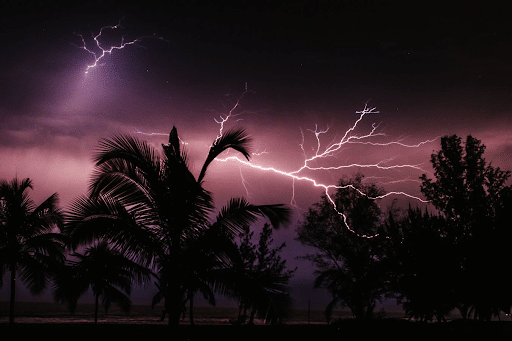Is your HVAC System Protected from Power Surges?
Protecting HVAC from power surges is crucial for maintaining the efficiency and longevity of your heating and cooling systems. It is especially important for Florida homes, where power surges can strike at any time. They occur often without warning and can cause serious damage to your HVAC system. Sudden spikes in voltage can result from a variety of sources, such as lightning strikes, power outages, or electrical grid fluctuations. While many homeowners focus on the performance and efficiency of their HVAC system, protecting it from power surges is just as important.
In this post, we’ll explore how power surges can affect your HVAC system and the steps you can take to protect it.
How Power Surges Damage Your HVAC System
A power surge is a rapid spike in electrical voltage. When this occurs, the wiring inside your home and your appliances—including your HVAC system—are exposed to more electricity than they are designed to handle. Over time, even small surges can wear down the electrical components of your HVAC unit, and a large surge could potentially destroy them altogether.
Key components at risk include:
- Compressor – This is one of the most expensive parts of your HVAC system and can be fried by power surges.
- Capacitors – Surge damage to these can cause your system to lose efficiency or fail to start.
- Thermostat – Modern thermostats, particularly smart models, are sensitive to electrical fluctuations and may fail after a surge.
- Control Boards – These manage the operation of your HVAC system, and if damaged, they can disable the entire unit.
What Causes Power Surges?
While lightning strikes are the most well-known cause of power surges, they are not the only ones. In fact, everyday electrical activity can contribute to surges as well:
- Lightning Strikes: A direct strike can send a massive amount of voltage through your home’s wiring, causing damage to any electrical device connected to the system.
- Power Grid Fluctuations: Changes in the power grid, such as sudden reboots after an outage or equipment malfunctions, can cause significant power surges.
- Internal Power Surges: Common household appliances, like refrigerators and air conditioners, can cause internal surges, especially when they power on and off, sending fluctuations through your electrical system.
How to Protect Your HVAC System from Power Surges
Taking proactive measures to safeguard your HVAC system from power surges can save you from costly repairs and replacements. Here are some key strategies:
1. Install a Whole-House Surge Protector
A whole-house surge protector is one of the best ways to protect your HVAC system and all other electronic devices in your home. Installed at your main electrical panel, it blocks excessive voltage from entering your home’s wiring. This first line of defense can prevent damage from larger surges caused by external events like lightning or grid fluctuations. You can take advantage of FPL’s SurgeShild® Program.
2. Use a Dedicated HVAC Surge Protector
While whole-house surge protectors are highly effective, installing an additional surge protector specifically for your HVAC system adds another layer of protection. These are installed directly on your HVAC unit and provide targeted protection for sensitive components.
3. Regularly Inspect Your Electrical System
Ensuring your home’s electrical system is up to date and properly grounded is another important step. Outdated wiring or poor grounding can make your home more vulnerable to surges. Having a licensed electrician inspect your system regularly can prevent these vulnerabilities.
4. Install Surge Protectors for Other High-Energy Appliances
Since appliances like refrigerators and washing machines can cause internal surges, consider installing surge protectors for other high-energy devices in your home. By limiting the damage from internal surges, you can reduce the wear and tear on your HVAC system over time.
Additional Benefits of Surge Protection
Beyond protecting your HVAC system, surge protectors offer several other advantages, including:
- Energy Efficiency: Protecting your system from power surges keeps it running more efficiently, avoiding unexpected breakdowns or component failure due to electrical damage.
- Extended Equipment Life: Surges can shorten the lifespan of your HVAC unit by damaging essential components. With proper protection, you can extend the life of your system and avoid costly repairs or replacements.
- Peace of Mind: Knowing that your HVAC system is safeguarded against power surges provides peace of mind, especially during severe weather conditions when electrical surges are more common.
How Often Should Surge Protection Be Checked?
Surge protectors are built to last, but like any other electrical component, they can degrade over time. It’s a good idea to have them checked annually during your regular HVAC maintenance visit. Your technician can ensure that your surge protection is working properly and advise if any upgrades are necessary.
Protecting Your HVAC System from Power Surges
Investing in surge protection for your HVAC system is a smart way to avoid costly damage, extend the life of your equipment, and ensure your home stays comfortable all year long. Power surges are unpredictable, but with the right protective measures, you can safeguard your HVAC system from potentially devastating voltage spikes.
At Air Rescue, we offer a range of protective solutions, including comprehensive maintenance plans that include inspecting your system for surge vulnerabilities. Contact us today to learn more about how we can protect your home’s comfort and efficiency.








